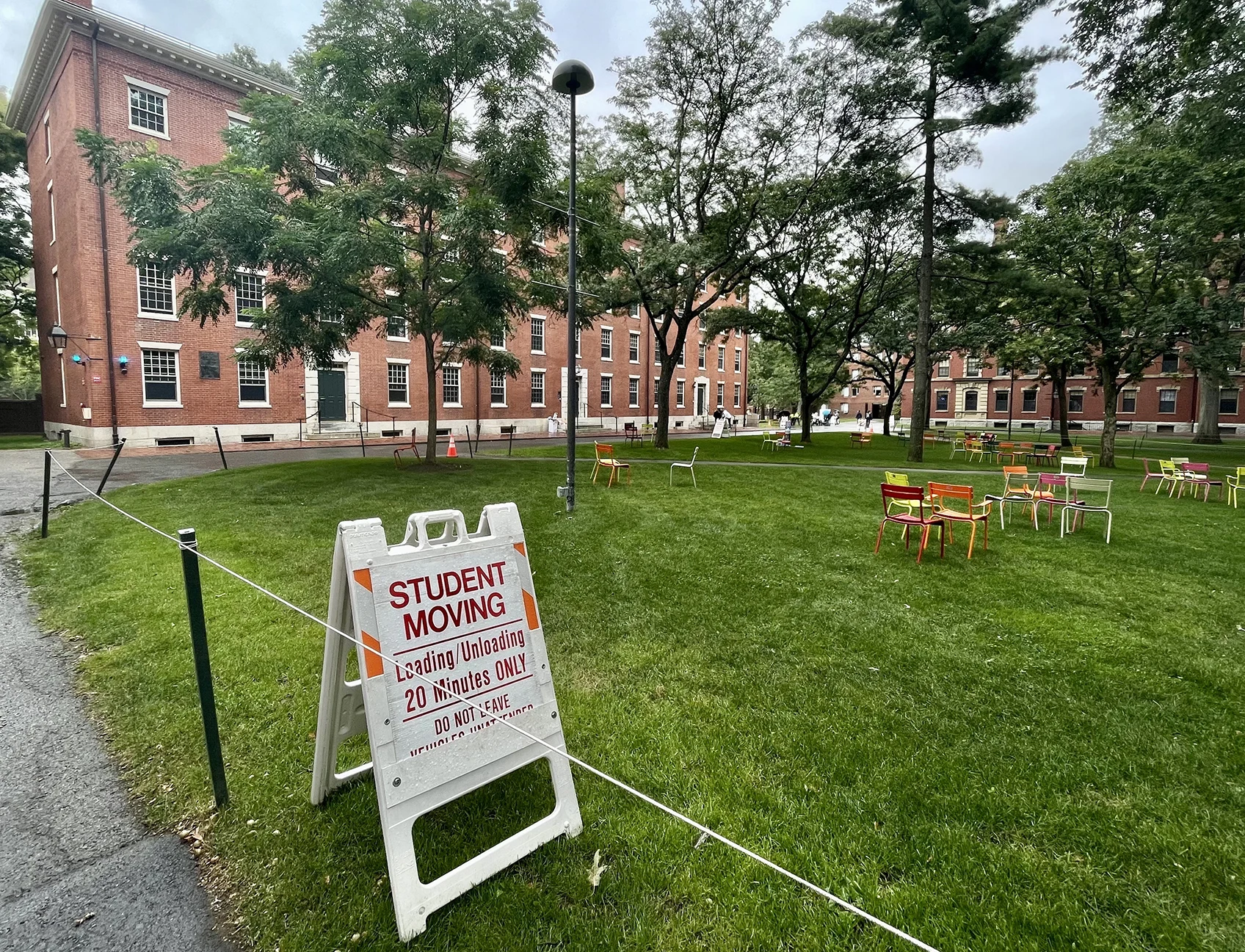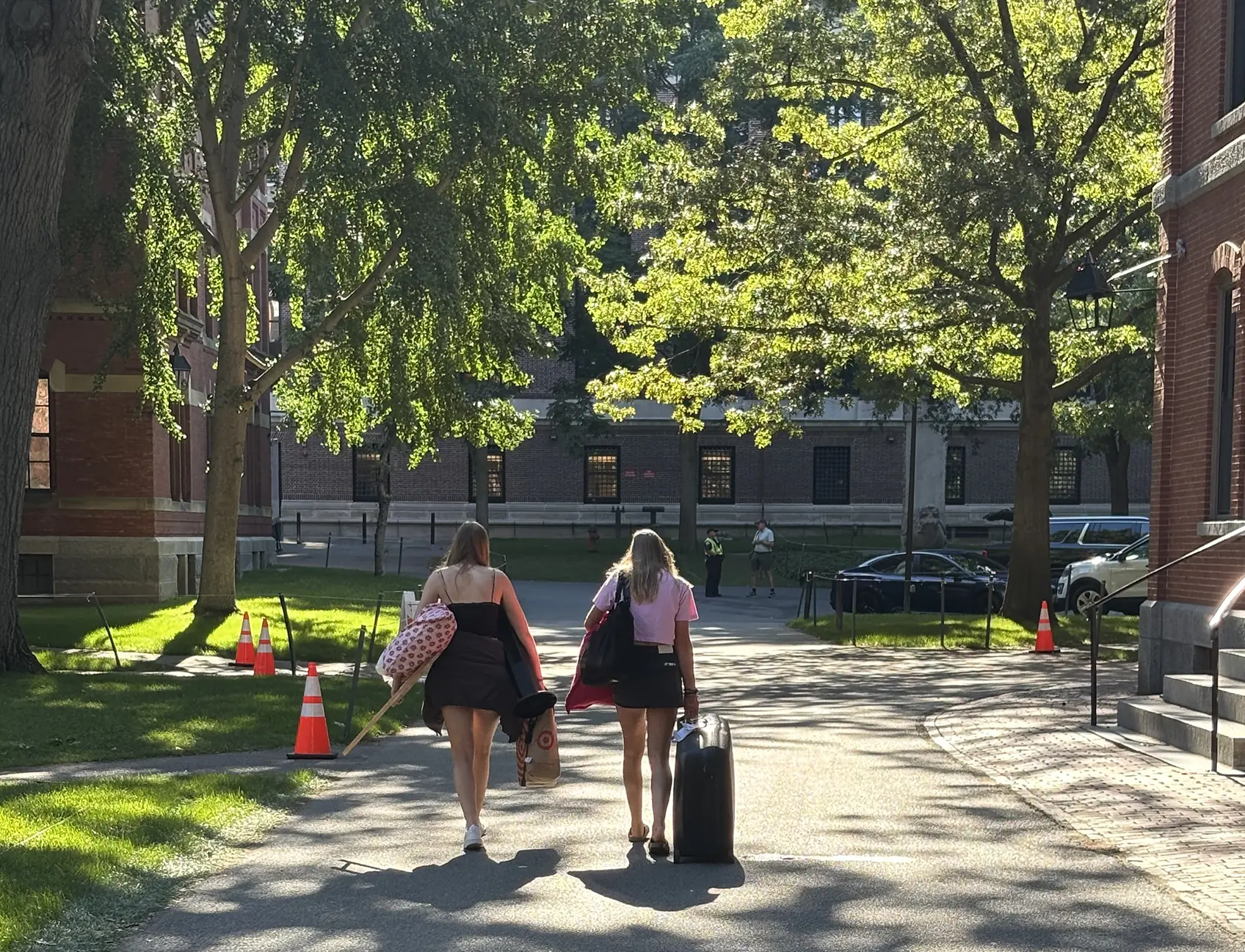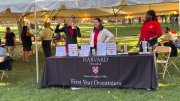When Harvard first-year students moved into the Yard in late August, the annual ritual arrived with a difference: every member of the class of 2029 had already taken a 90-minute online course designed to help them find an intellectual path through the College—and to grapple with ideas different from their own.
The pre-orientation course also set expectations for class attendance and participation, a priority identified in a Faculty of Arts and Sciences report on classroom culture last January, which found that, for many students, extracurricular activities have taken precedence over class attendance.
Dean of undergraduate education Amanda Claybaugh says the new program was intended to help incoming students think about what it means to think, act, and learn as a scholar at Harvard— something previous undergraduate cohorts often didn’t have to consider until weeks or months into their college careers.

Before the pandemic, Claybaugh explained in an interview, academic orientation was delivered almost entirely in person, when it competed for students’ attention with the stresses of meeting roommates, navigating new social networks, and figuring out how operate the laundry machines. When the campus was shut down in 2020, Zoom-based sessions replaced these face-to-face encounters, but the information provided focused heavily on rules and regulations.
“The only message we were communicating about academics was: this is what you need to graduate, and when you get into trouble, we have tutors, and we have coaches, and we have mental health supports,” Claybaugh recalled. “We also wanted to move away from the firehose of information students used to get in a few jam-packed days of orientation…This new approach lets us center the academic mission from the very beginning”—and at a time when students are ready to think about it.
A Guided Intellectual Transformation
The course is structured around three units. Unit 1, “An Intellectual Transformation Awaits You,” sets the tone, introducing students to how college demands more independence, creativity, and resilience than high school. It includes segments on “how college is different from high school,” including “a somewhat strict video” from Claybaugh “telling them that it’s going to take a lot of hours and they should block out time for each of their courses,” and another on “answering the call of challenging conversations.”
That last module, led by historian Maya Jasanoff, addresses the importance of encountering diverse viewpoints in the classroom and of learning from disagreement—identified as a key learning experience that has been stymied in part by student-driven, social-media-enforced conformity. In one example, Jasanoff speaks as a historian about why we read texts from different periods, in which some of the ideas are offensive to contemporary readers but explains that it is still possible to learn from them. Students are encouraged to see such moments not as obstacles, but as opportunities to broaden their understanding of the world and of one another, a practice President Alan M. Garber repeatedly encouraged in speeches during Commencement week this spring.
Unit 2, “Your Intellectual Interests at Harvard,” helps students connect their personal passions to the College’s concentrations. Modules walk them through topics such as “From Your Interests to Harvard’s Concentrations” and “Laying a Foundation for a Concentration” and culminate in tools for selecting courses that align with students’ budding academic interests.
“It’s open by design,” says Gillian Pierce, the associate dean for undergraduate education, “encouraging students to explore multiple pathways.”
Claybaugh says the modules were inspired by the Visitas program, in which admitted students visit campus in the spring and watch faculty give TED talk-style presentations of their research. In the pre-orientation program, students are presented with a list of questions and asked which ones appeal to them. When they choose one, a video of a Harvard faculty member talking about their research plays to “get students excited” about the work. Then students are introduced to the discipline—anthropology, for example—and are provided the title of a gateway course if they want to pursue their interest academically.
Unit 3 guides students into the nuts and bolts of coursework at Harvard. Along the way, students can link directly to course selection platforms my.harvard and Canvas, allowing them to move seamlessly from inspiration to registration.
The online course also showcases Harvard faculty as intellectual role models. In short videos, students hear Faculty of Arts and Sciences Dean Hopi Hoekstra describe how science in college involves grappling with failed experiments and incomplete data sets—because real discovery takes place at the frontiers of knowledge. English professor Derek Miller explains how he found his way into theater studies, and Claybaugh herself discusses how college work requires serious time management and deliberate effort.
While the pre-orientation is just a supplement to the idiosyncratic, in-person advising that is a Harvard hallmark, the course is “a way for us to standardize some of the advice that we’re giving students,” says Pierce, “to really ensure a good academic experience and a consistent set of recommendations for all students.”

Thousands of views
The pre-orientation course was enabled by a new Learning Experience Platform, based on the Business School’s HBX platform, which has been modified to meet the online education needs of the entire University. (Harvard Law School was the first to use the platform in the summer of 2023 for a pre-matriculation program targeting incoming J.D. and LL.M. students).
Thousands of views and downloads suggest students—and their families—are engaging deeply with the content, Claybaugh said. Many first-year students reported sharing videos with parents, giving first-generation families in particular a glimpse into the academic life awaiting their children.
Claybaugh noted that the course has also made her recognizable to freshmen. “I have students stop me in the Yard and say, ‘You told me not to worry about Gen Ed courses in my first year—but what if there’s one I really want to take?’” she says. “I think it’s made Harvard feel more welcoming.”









